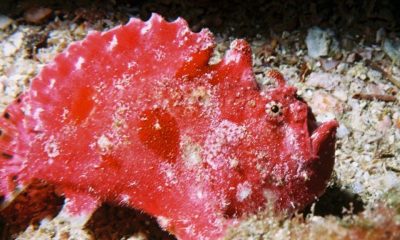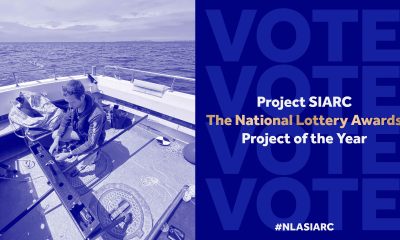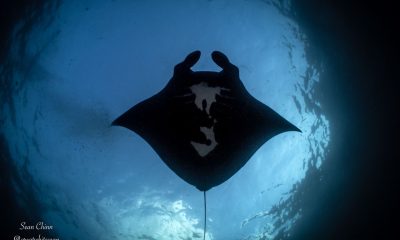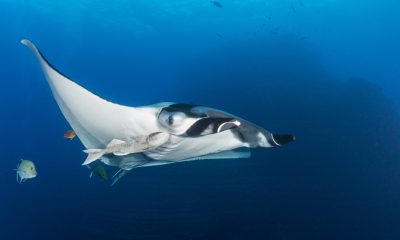News
Reef manta ray recorded for first time in Eastern Pacific
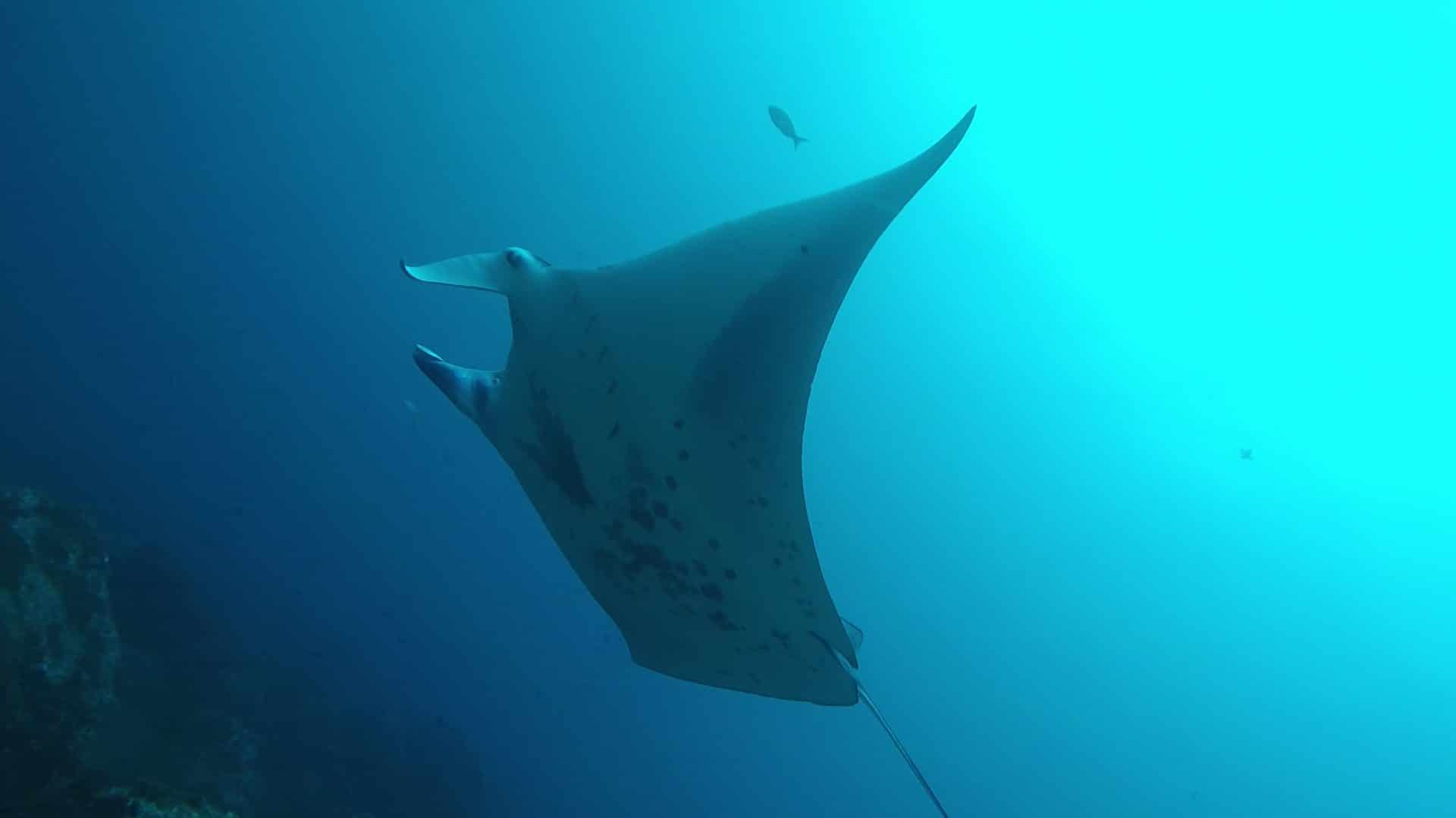
Chance sighting suggests ‘coastal manta’ may venture out further offshore than previously thought
A pregnant reef manta ray was encountered for the first time at the remote Cocos Island in the Eastern Tropical Pacific, challenging our current understanding of this threatened species, which is usually known to roam coastal waters. An international team of marine biologists has published their report this week.
Reef manta rays (Mobula alfredi), which grow up to 5 m, tend to be residential and are often found in shallow habitats where they are cleaned by reef fish or mate. Giant manta rays (Mobula birostris), on the other hand, have been recorded traveling vast distances and diving over 1000 m deep. It still remains a mystery how manta rays navigate the open ocean and what motives their long-distance movements.
The new study was authored by scientists and environmentalists from the Marine Megafauna Foundation, Fins Attached (both US), Pelagios Kakunjá in Mexico, and CREMA in Costa Rica (Centro Rescate Especies Marinas Amenazadas).
The 3.5 m reef manta reported in this study was seen in the waters off Cocos Island (Costa Rica), nearly 6000 km east from the nearest confirmed sighting location in the Marquesas Islands in French Polynesia and would represent the longest recorded straight-line distance traveled by any species of manta ray. It is also the first confirmed sighting of reef manta on either side of the American continent.
Randall Arauz of Fins Attached said: “Reef mantas may travel several hundred kilometers, although they tend not to travel too far offshore. It is unclear how this individual could have steered so far off course, leading us to assume it was not intentional.”
“The manta was close to the bottom swimming slowly against the current with its cephalic lobes fully extended, although it was not feeding at the time. When I saw her markings and pigmentation patterns, I knew that this manta was different from the ones we usually encounter in the region”, added Dr Mauricio Hoyos, who filmed the manta during a scientific dive in the national park.
The marine biologists uploaded photographs of the ray’s unique belly spot pattern to Manta Matcher, a global online database which includes contributions from ‘citizen scientists’, and compared them to more than 2800 registers from the Pacific.
Dr Andrea Marshall, co-founder and principal scientist at the Marine Megafauna Foundation said about the discovery: “I have been studying mantas for 16 years and they still constantly surprise me. This extraordinary sighting challenges everything we currently know about the migratory behavior of this species and its ability to undertake long-distance movements across open ocean environments.”
Interestingly, the reef manta was pregnant when observed in September 2018. Manta rays give birth to a single pup every 2-5 years, making them one of the slowest reproducing shark and ray species in the world. To date, no one has ever witnessed a manta ray give birth in the wild.
“If it hasn’t already happened, there is a possibility that this manta will give birth in Cocos Island”, Arauz commented.
The team fitted the manta with an acoustic tag, which can stay on for months, even years, logging the animals’ presence every time it comes past one of the listening stations placed around the island. Initial data revealed she has remained in the area. Listening stations deployed around other Eastern Tropical Pacific Islands, like Malpelo Colombia, or the Galapagos, Ecuador, will alert the researchers if she travels to either of these sites.
Marshall concluded: “It will be interesting to monitor her over the coming months and see how she uses this new, unfamiliar habitat. If she adjusts well to the conditions, it begs the question: why do reef mantas not ordinarily live in this part of the ocean? While unlikely, we also cannot ignore the possibility that small populations of reef mantas may in fact exist in the Eastern Pacific and have just gone undetected.”
“Perhaps most importantly, this research also provides tantalizing clues to how reef mantas may have so prolifically colonized the remote islands and archipelagos of the Indian Ocean and South Pacific.”
The scientific expeditions to Cocos Island were supported by the Whitley Fund for Nature, Conservation International, Sandler Foundation, and Friends of Cocos Island National Park.
The study by Randall Arauz et al., titled ‘First record of the reef manta ray, Mobula alfredi, from the eastern Pacific’ is published in the journal Marine Biodiversity Records on 20 March 2019 and will be available here.
News
Dive Worldwide Announces Bite-Back as its Charity of the Year

Over the next 12 months, specialist scuba holiday company Dive Worldwide will be supporting Bite-Back Shark & Marine Conservation with donations collected from client bookings to any one of its stunning dive destinations around the world. The independently-owned operator expects to raise £3000 for the UK charity.
Manager at Dive Worldwide, Phil North, said: “We’re especially excited to work with Bite-Back and support its intelligent, creative and results-driven campaigns to end the UK trade in shark products and prompt a change in attitudes to the ocean’s most maligned inhabitant.”
Bite-Back is running campaigns to hold the media to account on the way it reports shark news along with a brand new nationwide education programme. Last year the charity was credited for spearheading a UK ban on the import and export of shark fins.
Campaign director at Bite-Back, Graham Buckingham, said: “We’re enormously grateful to Dive Worldwide for choosing to support Bite-Back. The company’s commitment to conservation helps set it apart from other tour operators and we’re certain its clients admire and respect that policy. For us, the affiliation is huge and helps us look to the future with confidence we can deliver against key conservation programmes.”
To launch the fundraising initiative, Phil North presented Graham Buckingham with a cheque for £1,000.
Visit Dive Worldwide to discover its diverse range of international scuba adventures and visit Bite-Back to learn more about the charity’s campaigns.
MORE INFORMATION
Call Graham Buckingham on 07810 454 266 or email graham@bite-back.com
Gear News
Scubapro Free Octopus Promotion 2024

Free Octopus with every purchase of a SCUBAPRO regulator system
Just in time for the spring season, divers can save money with the FREE OCTOPUS SPRING PROMOTION! Until July 31st SCUBAPRO offers an Octopus for free
with every purchase of a regulator system!
Get a free S270 OCTOPUS with purchase of these combinations:
MK25 EVO or MK19 EVO with A700
MK25 EVO or MK19 EVO with S620Ti
MK25 EVO or MK19 EVO with D420
MK25 EVO Din mit S620Ti-X
Get a free R105 OCTOPUS with purchase of the following combinations:
MK25 EVO or MK19 EVO with G260
MK25 EVO or MK17 EVO with S600
SCUBAPRO offers a 30-year first owner warranty on all regulators, with a revision period of two years or 100 dives. All SCUBAPRO regulators are of course certified according to the new European test standard EN250-2014.
Available at participating SCUBAPRO dealers. Promotion may not be available in all regions. Find an authorized SCUBAPRO Dealer at scubapro.com.
More information available on www.scubapro.com.
-

 News3 months ago
News3 months agoHone your underwater photography skills with Alphamarine Photography at Red Sea Diving Safari in March
-

 News3 months ago
News3 months agoCapturing Critters in Lembeh Underwater Photography Workshop 2024: Event Roundup
-

 Marine Life & Conservation Blogs3 months ago
Marine Life & Conservation Blogs3 months agoCreature Feature: Swell Sharks
-

 Blogs2 months ago
Blogs2 months agoMurex Resorts: Passport to Paradise!
-

 Blogs2 months ago
Blogs2 months agoDiver Discovering Whale Skeletons Beneath Ice Judged World’s Best Underwater Photograph
-

 Gear Reviews2 weeks ago
Gear Reviews2 weeks agoGEAR REVIEW – Revolutionising Diving Comfort: The Sharkskin T2 Chillproof Suit
-

 Marine Life & Conservation2 months ago
Marine Life & Conservation2 months agoSave the Manatee Club launches brand new webcams at Silver Springs State Park, Florida
-

 Gear Reviews3 months ago
Gear Reviews3 months agoGear Review: Oceanic+ Dive Housing for iPhone





